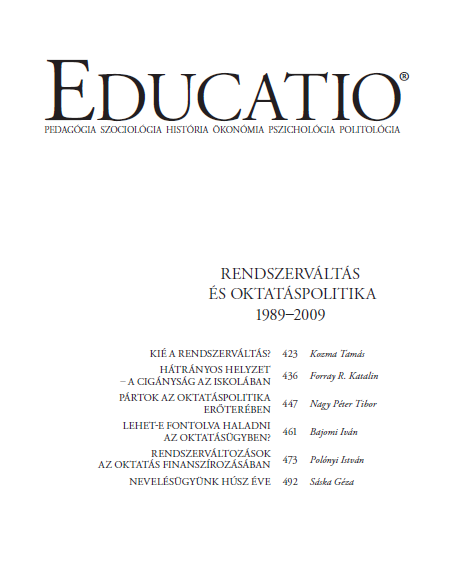Rendszerváltozások az oktatás finanszírozásában
Political transformations in the financing of education
Author(s): István PolónyiSubject(s): Education, State/Government and Education, Sociology of the arts, business, education, Sociology of Politics
Published by: Akadémiai Kiadó
Keywords: Education; Financing education; Politics; The Minister of Education;
Summary/Abstract: Principles within the political transformation of education (self-governing, pluralism, and autonomy) are now uncertain. The Minister of Education and the initiators of the Education Green Paper were of the opinion in 2009 that the solution to educational problems could only come when the centralization factor was dealt with. It was believed that the unsettled socioeconomic background differences are too great; while current maintainers of the status quo and education financing are unable to compensate for these differences. The efforts of the educational government failed. It did not ensure that education law would guarantee a high amount of central support. Under successive administrations, self-governance (i.e. local government increasing its own financial contributions) versus centralization (i.e. increases in central contributions) has been the issue. All election promises were directed towards centralization – while each new government went in the other direction. Parties wishing more centralization of educational policy always get the attention as they appear to be more active and stronger – which is important in relation to the way they govern; then, voters can be won over. And after elections, such promises are still a part of the cabinet’s politics – later, however, resources devoted to education will be again reduced; thus is the rhetoric of self-governance. Financing the education sector’s independence is also something causing controversy; and there was a break here in 1998 because of an agreement with the Vatican, which increased inequalities within education. Since the political transformation, schools located in little settlements have been the big, unsolved problem; for small schools in small settlements have higher operating costs, and these forms of school self-government have very little income. Yet it is not only a financing problem – the social composition of village populations and a lack of teachers are having a significant impact on education and its quality here, which leads to there being weaker students’ and weaker learning results. And the uncertainty here is traceable to existing government policy and public education funding instabilities.
Journal: Educatio
- Issue Year: 18/2009
- Issue No: 4
- Page Range: 473-491
- Page Count: 19
- Language: Hungarian

